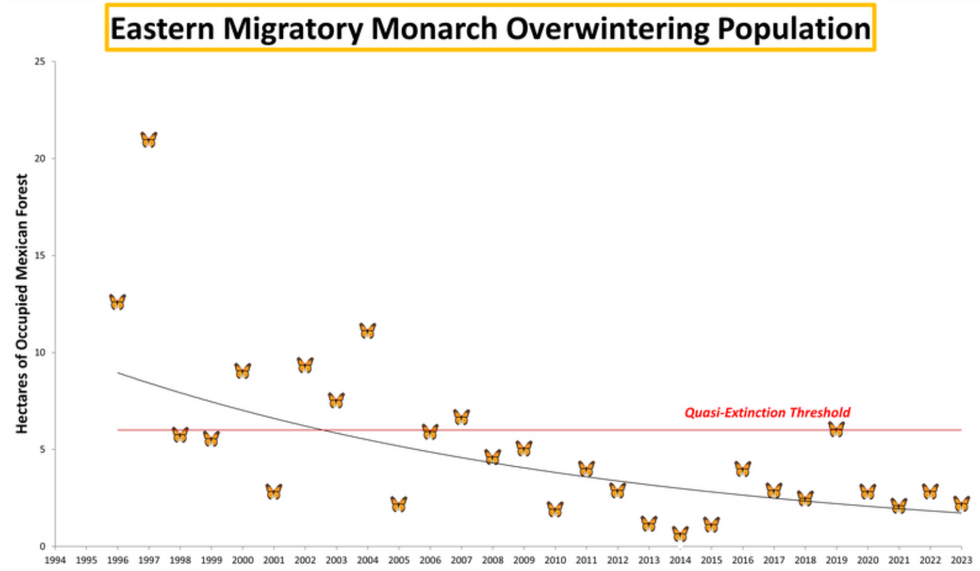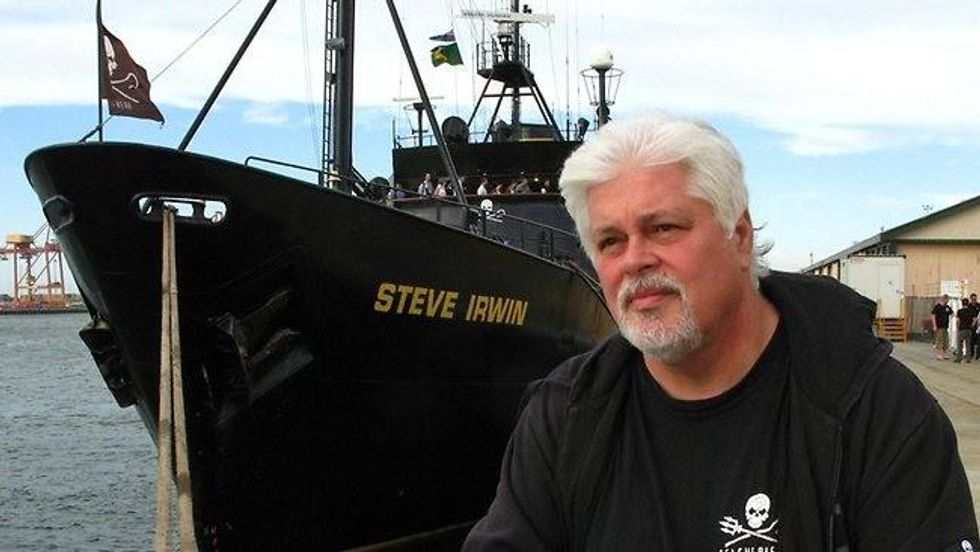

SUBSCRIBE TO OUR FREE NEWSLETTER
Daily news & progressive opinion—funded by the people, not the corporations—delivered straight to your inbox.
5
#000000
#FFFFFF
To donate by check, phone, or other method, see our More Ways to Give page.


Daily news & progressive opinion—funded by the people, not the corporations—delivered straight to your inbox.
"The FWS is tasked with preventing extinctions, using sound science when making decisions to prevent those extinctions, and with being accountable to the entire public—not funding controversial predator-control actions for the purported benefit of a few."
A rulemaking petition demanding an end to federal support for the removal of wolves and bears from states such as Alaska has been languishing at the U.S. Interior Department for almost two years, nearly three dozen conservation groups and scientists said in a letter to Interior Secretary Deb Haaland on Tuesday as they raised alarm about a recent killing operation.
Led by Public Employees for Environmental Responsibility (PEER), the Humane Society of the United States, and the Global Indigenous Council, 35 organizations wrote to the secretary to raise alarm about the U.S. Fish and Wildlife Service's (FWS) continued funding of "irresponsible and controversial predator-control projects."
Nearly 30 groups
signed the petition in September 2021 that demanded a rulemaking process to stop federal subsidies from supporting so-called "conservation projects" in which state officials oversee the killing of certain predator species—regardless of their federal protected status—in order to boost populations of other species.
"Since its submission the petitioners have not received a response," wrote the groups on Tuesday. "We request a meeting with the secretary to discuss the rulemaking petition."
The letter was sent two months after the Alaska Department of Fish and Game (ADFG) concluded a large-scale operation in which it gunned down 94 brown bears, including cubs, five black bears, and five wolves in order to increase "caribou calf recruitment" in southwestern Alaska. Caribou are often targeted by game hunters in the state.
Claiming to run a program aimed at boosting sustainability in Alaska, ADFG agents "shoot brown bears and black bears from helicopters, snare bears, and even shoot mother brown bears accompanied by cubs," wrote the groups. "Wolves face similar fates, and are targeted in the controversial 'Judas wolf' program in which radio-collared wolves who return to their pack enable ADFG agents to discover and eliminate the entire pack. The agency also aerial-guns wolves and poisons their pups in their dens."
The recent operation that took place in Alaska this spring appeared to be the largest of its kind in the state's history, with agents "inexplicably" killing at least four times as many brown bears as it had originally planned to.
The agency and other state game departments use federal aid that exceeds $1 billion annually to conduct such operations, according to PEER.
Haaland's rejection of the funding could help end the large-scale killings, the groups suggested Tuesday as they asked the interior secretary to meet with them.
Wendy Keefover, senior strategist for native carnivore protection for the Humane Society, said killing operations like the one that took place in Alaska "directly contradict federal wildlife policy," as the FWS is tasked with protecting species including brown bears and gray wolves and managing biodiversity.
"The Biden administration should suspend all further payments of federal funds to the Alaska Department of Fish and Game until its wildlife management complies with federal ecological standards," said Keefover.
Rick Steiner, board chair of PEER, also noted that killing operations are "economically counterproductive" in addition to being "scientifically bankrupt," as "millions of tourists travel to Alaska spending billions of dollars annually—just to catch a glimpse of Alaska's iconic bears and wolves in the wild."
The groups pointed to a letter signed by 55 wildlife scientists in 2018, which objected to the repeal of protections for carnivores in the interest of growing populations of caribou and other species—"privileging the human use" of wildlife "over all other considerations, including maintaining sustainable wildlife populations for future generations." The practice is ineffective, said the scientists, in addition to being disruptive of natural biodiversity.
"The scientific consensus for the last several decades has generally concluded that carnivores modulate ungulate prey populations and make them more vigorous, because predators remove the sick and weak animals which would die of other natural causes anyway, or because they reduce their competitors, including smaller wild carnivores such as coyotes, which prey on young ungulates," wrote the scientists. "Predator-control schemes, unpopular with both the Alaskan and American public are an unreliable and ineffective way to increase the abundance of ungulate."
In their letter to Haaland Monday, the groups warned that "the extinction crisis is not an abstraction; it is a clear and present danger and an impending catastrophe."
"The FWS is tasked with preventing extinctions, using sound science when making decisions to prevent those extinctions, and with being accountable to the entire public—not funding controversial predator-control actions for the purported benefit of a few," they wrote. "For these reasons, we urge your office to again consider our petition and meet with us to discuss the issues."
"Despite heroic efforts... we could still lose these extraordinary butterflies by not taking bolder action," warned one conservationist.
Wildlife conservationists sounded the alarm Wednesday as an annual count of monarch butterflies revealed a sharp decline in the number of the iconic insects hibernating in Mexican forests, stoking renewed fears of their extinction.
The annual survey—led by Mexico's National Commission of Natural Protected Areas and the Mexican branch of the World Wildlife Fund for Nature (WWF)—showed a 22% drop in the hibernating monarch population amid accelerating habitat loss driven primarily by deforestation.
"Despite heroic efforts to save monarchs by planting milkweed, we could still lose these extraordinary butterflies by not taking bolder action," Tierra Curry, a senior scientist at the Center for Biological Diversity (CBD), said in a statement.
"Monarchs were once incredibly common," she added. "Now they're the face of the extinction crisis as U.S. populations crash amid habitat loss and the climate meltdown."
Renowned for its epic annual migrations from the northern U.S. and southern Canada to Florida, California, and Mexico, monarchs have suffered a precipitous plunge in population in North America this century.
According to the U.S. Fish and Wildlife Service (FWS), the number of eastern monarchs fell from around 384 million in 1996 to 60 million in 2019, and in the West their numbers declined from 1.2 million in 1997 to fewer than 30,000 last year.
As CBD noted:
At the end of summer, eastern monarchs migrate from the northern United States and southern Canada to high-elevation fir forests in central Mexico. Scientists estimate the population size by measuring the area of trees turned orange by the clustering butterflies...The eastern population has been perilously low since 2008.
Last year, the International Union for Conservation of Nature formally listed the monarch butterfly as endangered, citing critical threats posed by the climate emergency, deforestation, pesticides, and logging.

In the United States, the Trump administration in 2020 placed monarchs on the wait list for consideration for Endangered Species Act protection. FWS has until next year to make a final listing determination.
"It is not just about conserving a species, it's also about conserving a unique migratory phenomenon in nature," said WWF Mexico general director Jorge Rickards. "Monarchs contribute to healthy and diverse terrestrial ecosystems across North America as they carry pollen from one plant to another."
"With 80% of agricultural food production depending on pollinators like monarchs, when people help the species, we are also helping ourselves," he added.

The 62-year-old Canadian, known as "The Captain," arrived in Los Angeles without being arrested, organizers with Sea Shepherd, a direct-action wildlife conservation organization that Watson founded in 1977, announced Thursday.
"I have returned to the United States," he declared Thursday on his Facebook page.
"Heading to Seattle to defend Sea Shepherd and myself from the SLAPP civil suit launched by the Japanese whalers," he added. "We carry on with our efforts to save the oceans, undeterred and undaunted."
He stated that he believes the Interpol "red notice" has been dropped.
Watson was arrested last year by Frankfurt authorities, who picked him up on a warrant from Costa Rica, where he staged a marine protest against shark finning over ten years ago. After being released on bail, he did not appear at his court-ordered meetings with police and instead skipped town, taking to the sea where he has been until his recent disembarkation in the United States.
Last winter, while on his marine journey, he participated in a blockade to protest Japanese whaling ships in the Antarctic.
Watson has slammed the Japanese government for politically targeting him due to his efforts to protect the oceans.
_____________________